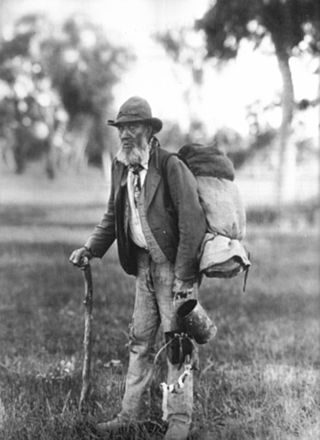Related Research Articles

"Advance Australia Fair" is the national anthem of Australia. Written by Scottish-born Australian composer Peter Dodds McCormick, the song was first performed as a patriotic song in Australia in 1878. It replaced "God Save the Queen" as the official national anthem by the Whitlam government in 1974, following an indicative opinion survey. The subsequent Fraser government reinstated "God Save the Queen" as the national anthem in January 1976 alongside three other "national songs": "Advance Australia Fair", "Waltzing Matilda" and "Song of Australia". Later in 1977 a plebiscite to choose the "national song" preferred "Advance Australia Fair". This was subsequently proclaimed the national anthem in 1984 by the Hawke government. "God Save the Queen" became the royal anthem, and is used at public engagements attended by the King or members of the royal family.

"Waltzing Matilda" is a song developed in the Australian style of poetry and folk music called a bush ballad. It has been described as the country's "unofficial national anthem".
Matilda or Mathilda may refer to:

Andrew Barton "Banjo" Paterson, was an Australian bush poet, journalist and author, widely considered one of the greatest writers of Australia's colonial period.

A swagman was a transient labourer who traveled by foot from farm to farm carrying his belongings in a swag. The term originated in Australia in the 19th century and was later used in New Zealand.

Nigel Dennis Patrick Wemyss-Gorman was an English actor and stage director born into a theatrical family.
"And the Band Played Waltzing Matilda" is a song written by Scottish-born Australian singer-songwriter Eric Bogle in 1971. The song describes war as futile and gruesome, while criticising those who seek to glorify it. This is exemplified in the song by the account of a young Australian serviceman who is maimed during the Gallipoli Campaign of the First World War. The protagonist, who had travelled across rural Australia before the war, is emotionally devastated by the loss of his legs in battle. As the years pass he notes the death of other veterans, while the younger generation becomes apathetic to them and their cause. At its conclusion, the song incorporates the melody and a few lines of lyrics of the 1895 song "Waltzing Matilda" by Australian poet Banjo Paterson.

The Man from Snowy River is a 1982 Australian Western drama film based on the Banjo Paterson poem "The Man from Snowy River". The film stars Kirk Douglas in a dual role as the brothers Harrison and Spur, Jack Thompson as Clancy, Tom Burlinson as Jim Craig, Sigrid Thornton as Harrison's daughter Jessica, Terence Donovan as Jim's father Henry Craig, and Chris Haywood as Curly. Both Burlinson and Thornton later reprised their roles in the 1988 sequel, The Man from Snowy River II.

John Francis O'Hagan was an Australian singer-songwriter and radio personality.
Ray Kernaghan is an Australian country music artist. He is married to Pam Kernaghan and they are the parents of musicians Lee, Greg, Tania and Fiona Kernaghan.
Ken Cameron is an Australian film and television director and writer. Cameron was born in Tenterfield, New South Wales, Australia and graduated from Sydney University with BA in 1968. He has won two AFI Awards for directing.
"Tom Traubert's Blues (Four Sheets to the Wind in Copenhagen)" (commonly known as "Tom Traubert's Blues" or "Waltzing Matilda") is a song by American musician Tom Waits.

Dagworth Station is a cattle station located north-west of Winton in central west Queensland in Australia. It was established in 1876 by Messrs Hunter and Urquhart who were living in a grass hut on the property in 1878 when they were still building up the run. One of the adjoining properties in 1887 was Elderslie Station, which at the time was owned by Sir Samuel Wilson.

The Australia women's national soccer team is overseen by the governing body for soccer in Australia, Football Australia, which is currently a member of the Asian Football Confederation (AFC) and the regional ASEAN Football Federation (AFF) since leaving the Oceania Football Confederation (OFC) in 2006. The team's official nickname is "the Matildas" ; they were known as the "Female Socceroos" before 1995.
Waltzing Matilda is a 1933 Australian film directed by and starring Pat Hanna. It features Coral Browne.
Alyson Best is an Australian actress known for her appearance in Prisoner (1983) and Man of Flowers (1983). In 1979 she appeared in a famous photo with Derryn Hinch in Playboy.

James Inglis was a colonial tea planter, merchant, writer who worked in India before serving as a politician in colonial New South Wales. He was involved in tea trade between India and Australia. He also wrote poetry, books on travel and sport hunting.
Arnfried Heyne was a German film editor, who also worked as assistant director. He was one of several editors to work on Leni Riefenstahl's Olympia (1938).
Emil Hasler was a German art director who worked on more than a hundred films during his career. These included a number of Weimar classics such as Diary of a Lost Girl, M and The Blue Angel. He later worked in Nazi era cinema on films like Robert Koch and Münchhausen.
"Waltzing Matilda" is an 1895 Australian bush ballad written by Banjo Paterson.
References
- ↑ Marshall, Valda (17 January 1960). "TV Merry Go Round". Sydney Morning Herald. p. 88.
- ↑ "TELEVISION PARADE". The Australian Women's Weekly . Australia. 7 August 1957. p. 10. Retrieved 22 January 2020– via Trove.